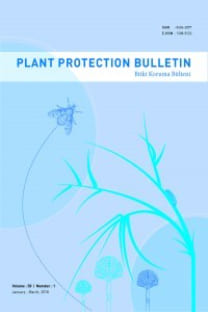Vermikompost ekstraktlarının bazı havai fungal bitki patojenleri baskılama etkinliğinin belirlenmesi
Tarımda vermikompost kullanımı, özellikle organik tarımda giderek yaygınlaşmaktadır. Bu araştırmada, ülkemizde ilk kez meyve ağaçlarına zarar veren ve meyve üretim alanlarında yaygın olan bazı havai fungal bitki patojenlerine (Monilinia laxa, Cytospora leucostoma, Botryosphaeria obtusa, Phomopsis viticola, Alternaria mali ve Botrytis cinerea) karşı at ve sığır vermikompost ekstraktlarının baskılama etkinliği araştırılmıştır. At ve sığır vermikompostlarının %25, %50, %75 ve %100 konsantrasyonları, fungal bitki izolatlarına karşı test edilmiştir. Hazırlanan vermikompost ekstraktlarının baskılama oranları petri kaplarında denenerek, sonuçlar iki yönlü ANOVA ile istatistiksel olarak değerlendirilmiştir. At ve sığır vermikompostları için en iyi sonuçlar sırasıyla %100 konsantrasyonda M. laxa (%90.6), P. viticola (%80.2) ve A. mali'de (%65.1) bulunurken, B. obtusa (%44.7), C. leucostoma (%38.1) ve B. cinerea’nın (%35.5) baskılanması daha düşük bulunmuştur.
Anahtar Kelimeler:
vermikompost ekstraktı, at, sığır, bitki, fungal patojen
Determination of suppression efficiency of vermicompost extracts on some aerial fungal plant pathogens
The use of vermicompost in agriculture has become increasingly common, especially in organic agriculture. In this research, the suppression efficiency of horse and cattle vermicompost extracts against some aerial fungal plant pathogens (Monilinia laxa, Cytospora leucostoma, Botryosphaeria obtusa, Phomopsis viticola, Alternaria mali, and Botrytis cinerea) that damage fruit trees and are common in fruit production areas, was studied for the first time in our country. 25%, 50%, 75%, and 100% concentrations of horse and cattle extracts were tested against fungal plant isolates. The results were evaluated by two-way ANOVA testing the suppression rates of vermicompost extracts in petri plates. While the best results were found in M. laxa (90.6%), P. viticola (80.2%), A. mali (65.1%) at 100% concentration for horse and cattle vermicomposts respectively, the suppression of B. obtusa (44.7%), C. leucostoma (38.1%), and B. cinerea (35.5%) was found to be lower.
Keywords:
vermicompost extract, horse, cattle, plant, fungal pathogen,
___
- Abbot W.S., 1925. A method of computing the effectiveness of an insecticide. Journal of Economic Entomology, 18, 265-267.
- Anonymous, 2020. https://www.kizilsolucangubresi.com/turkiye-ne-kadar-solucan-gubresi-uretiyor/ (date of accessed: 11.11.2020).
- Arancon N.Q., Edwards C.A., Dick R., Dick L., 2007. Vermicompost tea production and plant growth impacts. Biocycle, 48 (11), 51.
- Bharadwaj A., Bhatia A.K., Agrawal A.K., 2014. Comparative analysis on the fungistatic activity of saline soils and vermicompost amended soils. CIBTech Journal of Microbiology, 4 (1), 68-77.
- Din A.R.J.M., Hanapi S.Z., Sarip S.H.M., Sarmidi M.R., 2018. Disease-suppressive effect of compost tea against phytopathogens in sustaining herbal plant productivity. In: Sustainable Technologies for the Management of Agricultural Wastes (pp. 99-117). Springer, Singapore.
- Edwards C.A., Bohlen P.J., 1996. Biology and Ecology of Earthworms. 3rd. Ed. Chapman and Hall, New York, 39-40.
- Edwards C.A., Arancon N.Q., Greytak S., 2006. Effects of vermicompost teas on plant growth and disease. Biocycle, 47 (5), 28.
- Erşahin Y.Ş., 2013. Vermikompost ürünlerinin bitki koruma amaçlı kullanımı, TEMA Vakfı Ulusal Vermikültür Çalıştayı Bildiriler Kitabı. Haktanır K., (Ed.).. İstanbul, 13-19.
- Kangmin L., 2005. Vermiculture industry in circular economy. Worm Digest, 1, 13-27.
- Koné S.B., Dionne A., Tweddell R.J., Antoun H., Avis T.J., 2010. Suppressive effect of non-aerated compost teas on foliar fungal pathogens of tomato. Biological Control, 52 (2), 167-173.
- Kurbetli İ., Demirci F., 2014. Outbreak of stem canker and dieback of pear trees caused by Botryosphaeria obtusa (anamorph Diplodia seriata) in Turkey. New Disease Reports, 30, 6.
- Levins G., Vikmane M., Ķirse A., Karlsons A., 2017. Effect of vermicompost extract and vermicompost-derived humic acids on seed germination and seedling growth of hemp. In: Proceedings of the Latvian Academy of Sciences. Section B. Natural, Exact, and Applied Sciences, 71 (4), 286-292.
- Mısırlıoğlu M., 2011. Toprak solucanları biyolojileri, ekolojileri ve Türkiye türleri. Ankara: Nobel Yayınları, 1636, 20-92.
- Patangray A.J., 2014. Vermicompost: beneficial tool for sustainable farming. Asian Journal of Multidisciplinary Studies, 2 (8), 254-257.
- Scheuerell S., Mahaffee W., 2002. Compost tea: principles and prospects for plant disease control. Compost Science & Utilization, 10 (4), 313-338.
- Shanmugasundaram R., Jeyalakshmi T., Saravanan M., Mohan S.S., Goparaju A., Murthy P.B., 2013. Influence of some biological wastes and their combination on growth and reproduction potential of earthworm, Eisenia fetida and their effect on plant growth. International Journal of Environment and Waste Management, 11 (4), 387-398.
- Soylu E.M., Soylu S., Kara M., Kurt Ş., 2020. Sebzelerde sorun olan önemli bitki fungal hastalık etmenlerine karşı vermikomposttan izole edilen mikrobiyomların in vitro antagonistik etkilerinin belirlenmesi. KSÜ Tarım ve Doğa Dergisi, 23 (1), 7-18.
- Tutar U., 2013. Toprak solucanlarından elde edilen vermikompostun bazı bitki patojenleri üzerindeki antimikrobiyal aktivitelerinin araştırılması. Cumhuriyet Science Journal, 34 (2), 1-12.
- Yağmur B., Eşiyok D., 2016. Solucan gübresi: vermikompost – III (Vermikompostun Kullanım Alanları) http://www.dunyagida.com.tr/haber.php?nid=3202.
- ISSN: 0406-3597
- Yayın Aralığı: Yılda 4 Sayı
- Başlangıç: 1952
- Yayıncı: Zirai Mücadele Merkez Araştırma Enstitüsü Müdürlüğü
Sayıdaki Diğer Makaleler
Siyah çayda sülfüril florit fumigasyonu sonrası florür iyonu kalıntısının değerlendirilmesi
Huseyin ÖZDİKMEN, Neslihan BAL
Vermikompost ekstraktlarının bazı havai fungal bitki patojenleri baskılama etkinliğinin belirlenmesi
Servet UZUNOK, Şebnem KUŞVURAN
Turunçgil bahçesinde farklı renk tuzaklarındaki yaprakbiti aktivitesi
Mehmet KARACAOĞLU, Işıl ÖZDEMİR, Mustafa ÖZDEMİR, Serdar SATAR
